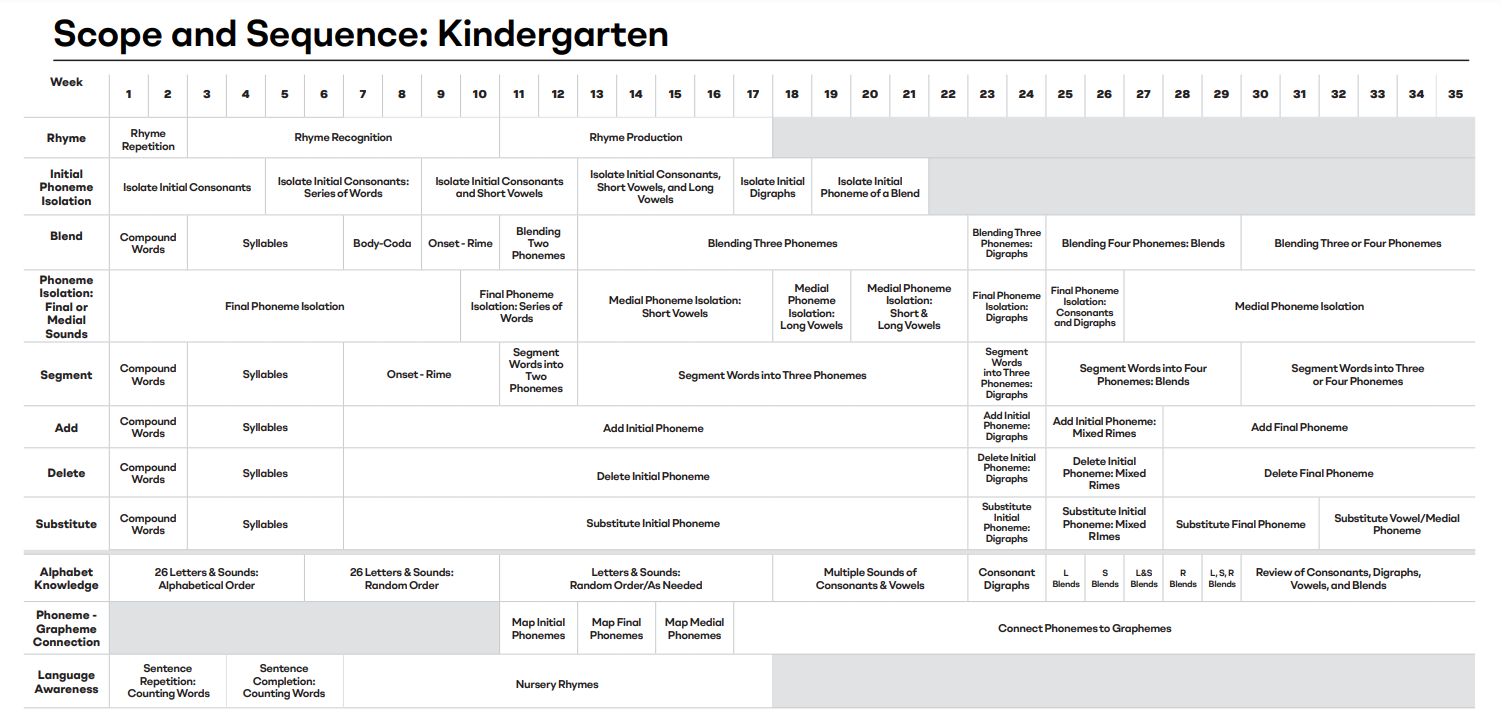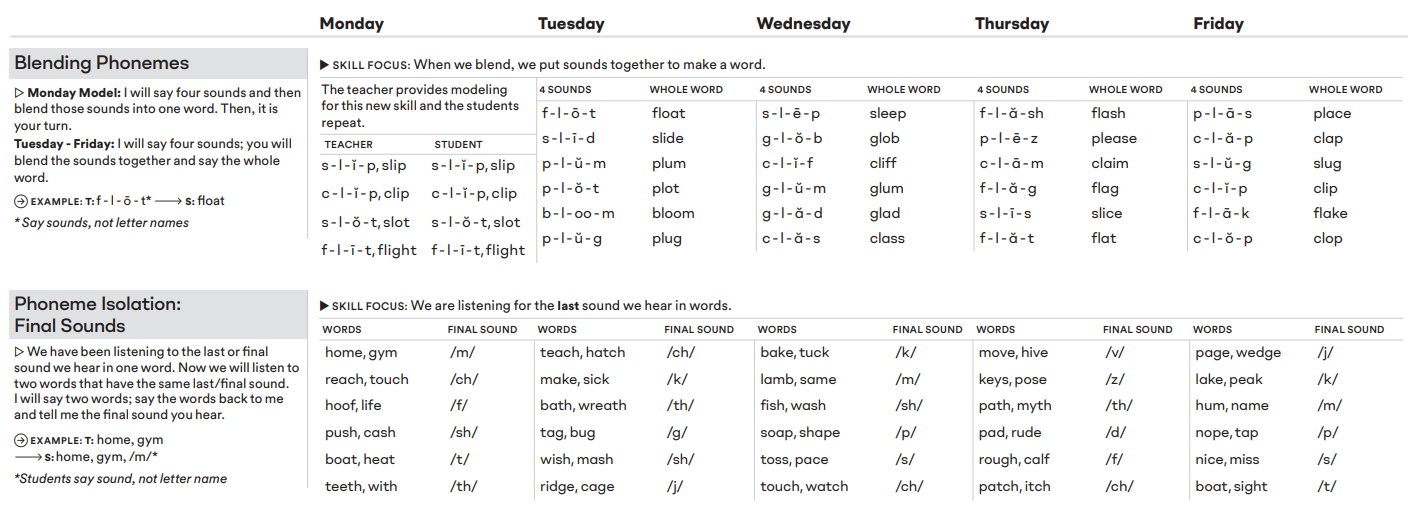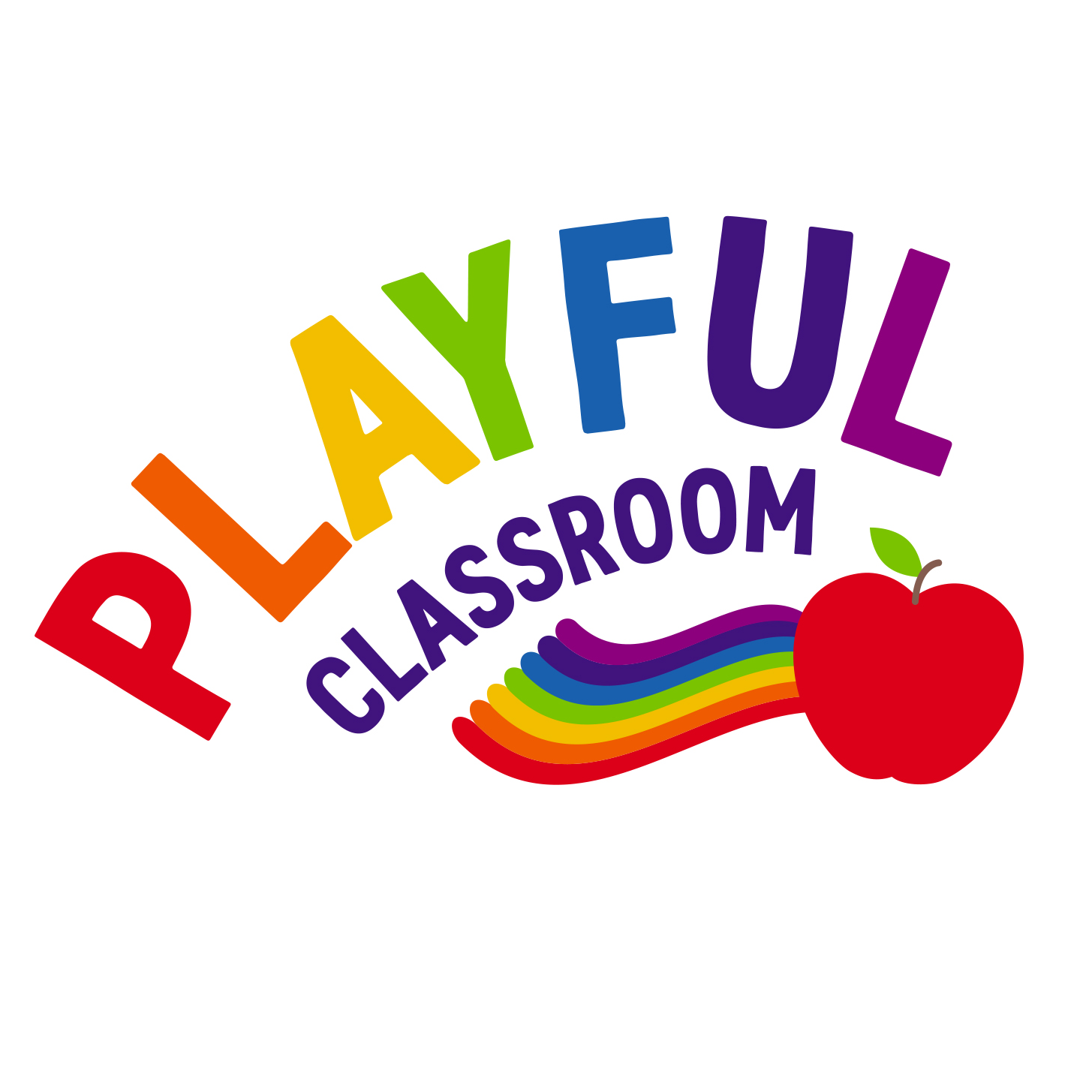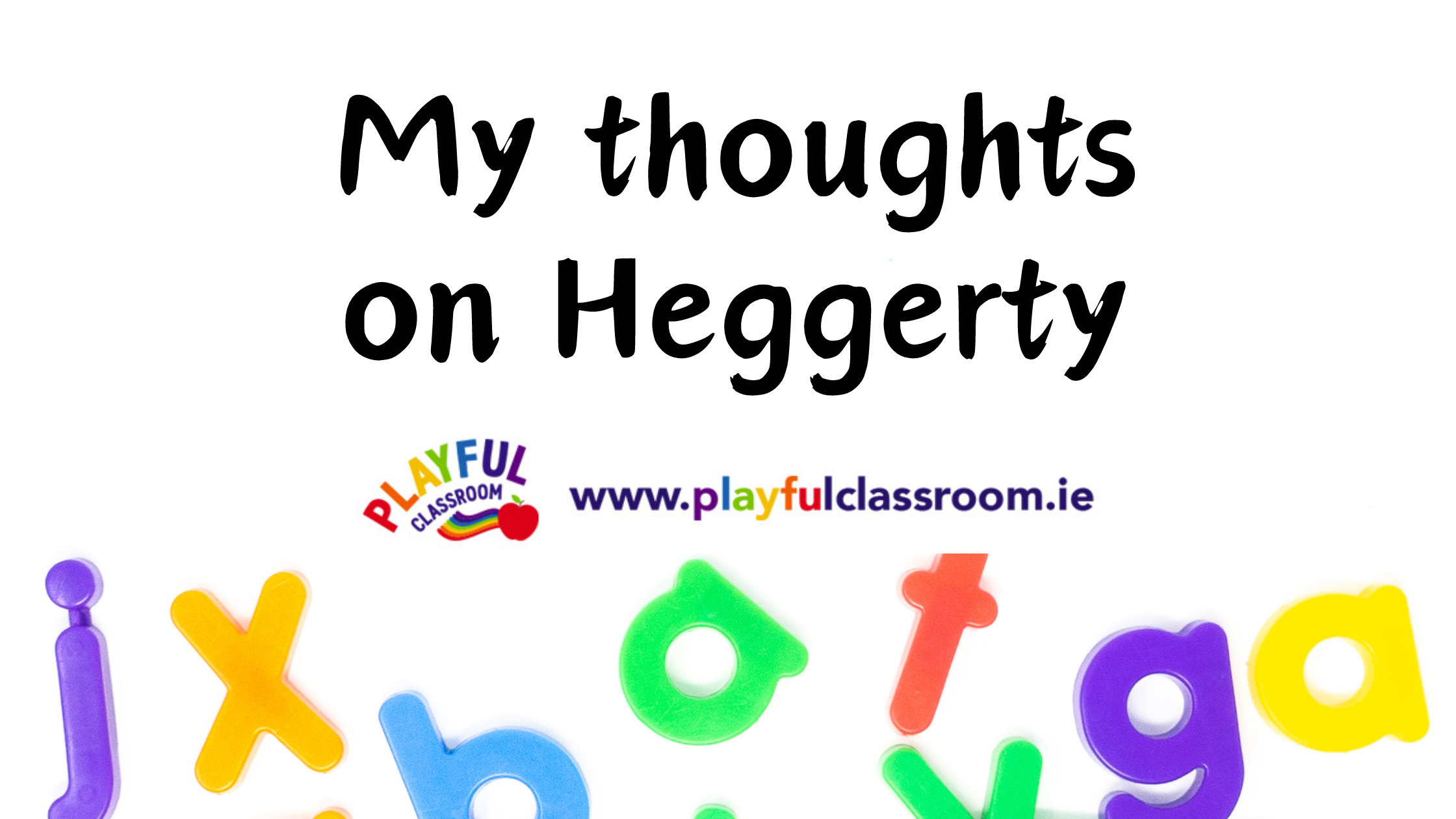Heggerty Phonemic Awareness
This blog post reflects my personal opinions and thoughts, based on reading, research, and experiences teaching, training, and consulting. I have no affiliation with or commercial interests in Heggerty.
What is Heggerty?
Heggerty is a Phonological and Phonemic Awareness programme intended for use from pre-school to 1st Grade, which in the Irish context roughly translates to Junior Infants to 1st Class. It is an oral and auditory programme that focuses on the sounds of the English language, with a view to transferring the skills to reading and writing. There is a years’ worth of lessons for each year group, with each lesson taking approximately 10 minutes.

Heggerty begins by teaching awareness of larger units of sound, such as syllables, progressing to the smallest unit of sound, the phoneme. In each lesson, the children isolate, blend, segment, and manipulate sounds, with modelling and scaffolding from the teacher. Hand motions are used to reinforce the skills.
What are the benefits of using Heggerty?
Being a systematic programme, Heggerty starts with more simple concepts, gradually moving to more complex ones. Paulson (2004) found that young children develop PA skills along a “general hierarchy of linguistic complexity”, similar to the progression followed in the Heggerty programme.
Crucially, Heggerty brings attention to the sounds that we hear in words. This awareness is essential for understanding the alphabetic principle, that words are made up of letters that represent the sounds of speech. Heggerty provides explicit and systematic instruction in phonological awareness skills that can then be used to decode and encode words in print.

Extract from a sample lesson in the Kindergarten programme
Phonemic awareness is a foundational skill, and instruction in PA has been repeatedly shown to help children become skilled readers and spellers, including children with additional educational needs (NRP 2000; NELP 2008; Melby-Lervag et al. 2012; Erbeli et al. 2024). Specifically, blending and segmenting skills benefit decoding and encoding (Ehri et al. 2001).
The Heggerty programme operates on the basis that PA instruction will benefit children’s reading and spelling performance. In 2023, a study that used Heggerty found statistically significant gains in non-word reading over the course of a year (Banse and Shannon 2023). It is worth noting, however, that this study did not include a control group, so it is not possible to isolate Heggerty as the cause of the gains.
Many schools who are implementing Heggerty have previously not been using any other phonemic awareness programme. By adopting Heggerty, children in some of these schools are now receiving explicit PA instruction for the first time. This could serve to improve reading and spelling achievement for a lot of children, particularly those who are at risk of reading difficulties.
Why is Heggerty popular?
Heggerty is popular with both teachers and children. It is fast-paced, with choral response and hand motions to keep the children engaged. Heggerty is easy for teachers to implement. Banse and Shannon (2023) found that three-quarters of teachers did not experience any challenges while implementing the programme, which my own experience visiting schools and working with teachers also attests to. The lessons are laid out in an easy-to-follow manner, with no prep required on the part of the teacher. Teachers with little prior knowledge of phonemic awareness can use Heggerty with ease.
Being a whole-class programme, Heggerty can negate the need for in-class support or station teaching in PA. School principals and in-school management are pleased to have a consistent approach to PA across their schools. While the Heggerty manuals are not cheap, no additional materials are required, so once the initial outlay is paid, there are no further costs.
What are the drawbacks of Heggerty?
Heggerty has its critics; and their concerns are worth examining.
Heggerty is an oral-only programme
Studies show that while oral PA activities are beneficial, PA instruction that includes letters is more effective. If Heggerty is implemented for 10 minutes every day, over the course of one school year, the time spent on oral PA activities would total 30 hours. A recent meta-analysis by Erbeli et al. (2024) indicated that approximately 10 hours of PA instruction was optimal. After that, there were diminishing effects. This was similar to the findings of the National Reading Panel in 2000. That is not to say that oral PA instruction in excess of the optimal time is harmful, but it does suggest that the time would be better spent on other activities. Negative effects were found once instruction exceeded 30 hours.
Too much time is spent on larger units of sound
While Heggerty moves along a continuum of easier to more difficult PA tasks, some contend that the time spent on larger units of sound is unnecessary, and possibly even harmful (Brady 2020). While the research here is not clear, it is generally accepted that it is important that PA instruction focuses on phonemes as soon as possible, so as to transfer the skills to decoding and encoding.
Heggerty teaches “advanced” PA skills
Heggerty includes numerous PA skills: rhyming, isolating, blending, segmenting, adding, deleting, and substituting. Blending and segmenting ability are known to benefit reading and spelling performance (Ehri et al. 2001), but the same can not be said for the oral manipulation skills of adding, deleting, and substituting. These skills are not necessary for skilled reading (Clemens et al. 2021). A focus on ‘advanced’ PA skills may not be harmful, but concerns have been raised about the use of valuable instruction time on them.

Extract from a sample lesson in the Primary (Grade 1) programme
Florida Center for Reading Research Report
Earlier this year, FCRR published a 'snapshot' of the results of a large quasi-experimental study which examined the reading achievement of students in Kindergarten, Grade 1, and Grade 2. The experimental group used Heggerty for one school year, and the control group received 'typical reading instruction'. Results indicated no advantage to using Heggerty. I will update this blog post when the full report is published, as at the moment there is very little information available. You can read the snapshot here: fcrr.org.
So, should I use Heggerty?
Oral PA instruction is beneficial, but its benefits are limited. There is no point in teaching PA unless the skills are applied to reading and spelling activities. Evidence shows that Effects of PA are enhanced when children are taught how to apply PA skills to reading and writing tasks (NRP 2000; Erbeli et al. 2024).
If implementing Heggerty, or any other oral PA programme, it would make sense to limit whole-class instruction to no more than 10 hours or so. This would mean either decreasing the daily time spent on the lessons to 5 minutes or less, or reducing the frequency of lessons.
Based on the lack of evidence to support the teaching of oral manipulation skills, a simple way to decrease the lesson time is to remove the addition, deletion, and substitution tasks. It may not be necessary to do the lessons every day, especially if the children are not in their first year of school, and/or have had previous explicit PA instruction.
It is extremely important that phonemic awareness is not taught in isolation. Phonemic awareness is not in itself a means to an end; it is crucial that children are taught to apply the skills to decoding and encoding (O'Toole 2023). Parts of Heggerty lessons may be adapted to include letters, depending on where the children are in their phonics scope and sequence.
For children at risk of reading difficulties, Heggerty may be particularly useful. Most dyslexics have difficulty with the sounds in words (Snow et al. 1998). This makes reading and writing more difficult than it does for those who are not dyslexic. Providing explicit instruction in phonemic awareness is particularly important for dyslexic children.
In conclusion, I think there is benefit to using the Heggerty programme, especially for teachers who do not feel confident in their knowledge of phonemic awareness, and for children at risk of reading difficulties. If using Heggerty, I suggest proceeding with some caution, paying attention to the amount of time allocated to oral PA activities, the use of ‘advanced’ PA tasks, and the inclusion of letters in PA activities. The most important factor is to consider the children sitting in front of you and their particular needs.
References
Banse, H. and Shannon, L. (2023) 'A Treatment-Only Study of the Heggerty Phonemic Awareness Curriculum: Final Report'.
Brady, S. (2020) 'A 2020 Perspective on Research Findings on Alphabetics (Phoneme Awareness and Phonics): Implications for Instruction (Expanded Version)'.
Clemens, N.H., Solari, E.J., Kearns, D.M., Fien, H., Nelson, N.J., Stalega, M.V., Burns, M., St. Martin, K. and Heoft, F. (2021) 'They Say You Can Do Phonemic Awareness Instruction “In the Dark”, But Should You? A Critical Evaluation of the Trend Toward Advanced Phonemic Awareness Training'.
Ehri, L.C., Nunes, S.R., Willows, D.M., Schuster, B.V., Yaghoub-Zadeh, Z. and Shanahan, T. (2001) 'Phonemic Awareness Instruction Helps Children Learn to Read: Evidence From the National Reading Panel's Meta-Analysis', Reading research quarterly, 36(3), 250-287, available: http://dx.doi.org/10.1598/RRQ.36.3.2.
Erbeli, F., Rice, M., Xu, Y., Bishop, M.E. and Goodrich, J.M. (2024) 'A Meta-Analysis on the Optimal Cumulative Dosage of Early Phonemic Awareness Instruction', Scientific studies of reading, 1-26, available: http://dx.doi.org/10.1080/10888438.2024.2309386.
Hart Paulson, L. (2004) The development of phonological awareness skills in preschool children: From syllables to phonemes, unpublished thesis (Doctor of Education), The University of Montana.
Little, C.W., Edwards, A.E., Harris, M., Santangelo, D., Terry, N.P (2023, November 21). Examining student reading achievement in the Heggerty Phonemic Awareness Curriculum. Florida Center for Reading Research. fcrr.org. https://doi.org/10.6084/m9.figshare.24585075
Melby-Lervag, M., Halaas Lyster, S.-A. and Hulme, C. (2012) 'Phonological Skills and Their Role in Learning to Read: A Meta-Analytic Review', Psychological bulletin, 138(2), 322-352, available: http://dx.doi.org/10.1037/a0026744.
NELP (2008) Developing Early Literacy: Report of the National Early Literacy Panel. A Scientific Synthesis of Early Literacy Development and Implications for Intervention: National Institute for Literacy.
NRP (2000) Report of the National Reading Panel: Teaching Children to Read: National Reading Panel.
O'Toole, D. (2023) 'Phonemic awareness instruction - What, when, why, and how?', Irish Teachers' Journal, 11. Available: https://www.researchgate.net/publication/376451560_Phonemic_awareness_instruction_-_What_when_why_an...
Snow, C.E., Burns, M.S. and Griffin, P. (1998) 'Preventing reading difficulties in young children'.


